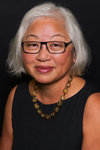

An hourlong presentation scheduled for 2 p.m. on Saturday at the Vernetta Smith Chehalis Timberland Library will feature century-old subject matter that bears a striking resemblance to current events.
Mayumi Tsutakawa will discuss the 100-year history of Japanese-Americans in Washington state against the backdrop of the run up to World War II as well as her family history in the region.
Her talk entitled “The Pine and the Cherry: Japanese Americans in Washington” is free to the public and is sponsored by Humanities Washington.
“She’s a really powerful speaker,” said Hannah Schwendeman, program manager and communications coordinator for Humanities Washington. “She’s been giving this particular talk since the beginning of 2017 and is one of our most popular speakers.”
After retiring from her longtime post with the Washington State Arts Commission in 2016, Tsutakawa revisited a thesis she wrote in college about pre-war Japanese-American newspapers in the Pacific Northwest.
A resident of Seattle, she decided to craft a conversation that overlays the history of Japanese people in the state with that of her own lineage.
Her father, George Tsutakawa, was a well-known painter and sculptor.
During World War II, he served as a member of the Military Intelligence Service in the U.S. Army. It was when he visited his sister at the Tule Lake internment camp in California that he met his future wife, Ayame.
He died in 1997.
“My dad had been raised in the same area of Japan as my mom,” Mayumi Tsutakawa said. “Their meeting was arranged when he visited his sister and it resulted in an arranged marriage between the two of them.”
Much of Tsutakawa’s presentation focuses on the less rosy side of history.
She outlines how Japanese immigrants faced racial discrimination well before the attack on Pearl Harbor and the subsequent internment of more than 100,000 Japanese persons.
Conservative groups lobbied state and federal governments to pass laws that negatively impacted the Japanese population.
Some people who attend Tsutakawa’s talks either don’t know about or aren’t fully aware of that portion of history, she said, often because they never learned it in school or from their families.
“I like to prod the audience about what is happening to immigrants today,” Tsutakawa said.
Many Japanese heads of household were picked up by federal authorities during the run-up to World War II and sent to secretive holding areas away from major cities.
Tsutakawa said she’s noticed that when she presents in rural areas where migrant workers are needed for agricultural work, there’s a noticeable level of sympathy and support for them, even those who are undocumented.
“There isn’t any direct comparison of mothers and children being separated like now,” Tsutakawa said. “We definitely have the situation of families being taken from their homes and neighborhoods where they’ve made lives and had jobs and gone to school.”
Tsutakawa tends to ask three questions during her presentations: What people would pack if they were allowed one suitcase to go to an unknown place for an unknown period of time, how a community should respond to racist or religious intolerance either past or present, and how a marginalized group should be compensated for ill treatment from within their own larger community.
Those who attend the presentation in Chehalis on Saturday should be prepared to place themselves in someone else’s shoes.